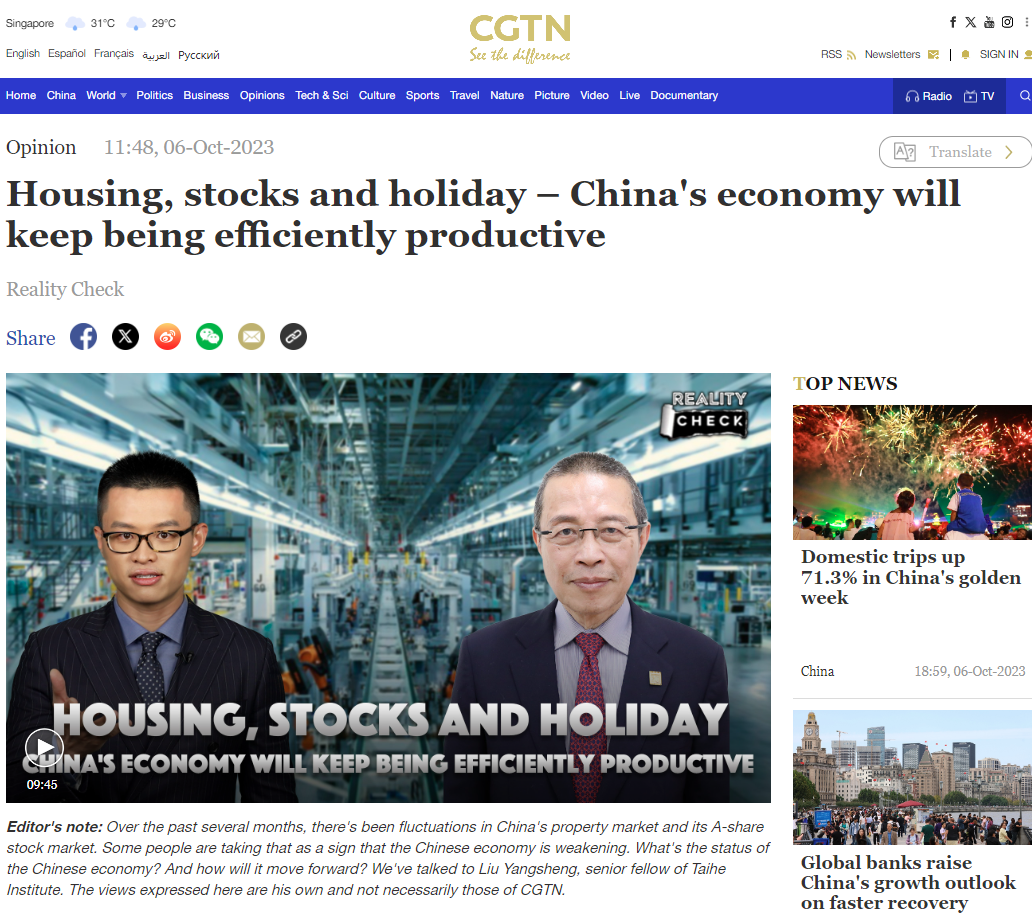LATEST INSIGHTS
Your Present Location: LATEST INSIGHTSLiu Yangsheng: Housing, stocks and holiday – China's economy will keep being efficiently productive
Source: CGTN Published: 2023-10-06


Over the past several months, there's been fluctuations in China's property market and its A-share stock market. Some people are taking that as a sign that the Chinese economy is weakening. What's the status of the Chinese economy? And how will it move forward?
CGTN: So, I would like to start off with some of the current events. As you must have heard, there's been some major events taken place over the past weeks and months in China's property market. The future of this sector has become one of the most closely watched issues by the Chinese themselves and by Western media. So, my question is, what's your assessment of China's property market at this moment?
Liu Yangsheng: I think the property market certainly has quite a bit of corrections to go. There has been too much leverage, too much over-extension in the property market over the course of the last two decades. It's brought a lot of wealth to people. And it also has brought a lot of gearing, which is very suspense, can cause problems. So, I think the property market is certainly on the top priority for the Chinese government in being able to address the economic issues of the country.
CGTN: What role do you see this sector play in the future of the Chinese economy?
Liu Yangsheng: I think it's now entered a different phase in the property market. There weren't enough housing before, and urbanization brought about massive amount of growth in the housing market, in the cities, including the second and third-tier cities or even fourth-tier cities. So, there's been quite a bit of building.
And I think it will continue to play a significant role, but a different role. For local governments selling land to developers will no longer be a major source of income for them as there has been. There would have to be other arrangements to seek income for the local government. That's inevitable because there just won't be the same type of demand for housing in the urbanization process that had existed in the last two decades. It will still play an important role, but the role will be different. It used to be playing the role of generating income for local governments, providing adequate housing, if not substantial housing for the population who are moving into the city.
But all of those roles will have to change. And it will play a different role. It will be housing for living in not for speculation. And there won't be the amount of heavy leverage that had existed before.
CGTN: Let's move on to another aspect of the Chinese economy. So, there's been some reports about foreign capitals pulling out of China's A-share stock market. Some people are taking that as a sign that the Chinese economy is weakening. You said in an earlier interview with us that this kind of reporting is biased and that China's situation has to be talked together with the situations of the whole world. So where would you rank the Chinese economy in the world at this moment?
Liu Yangsheng: There are two things that's significant with the Chinese economy. It is basically the most sophisticated supply chain for manufacturing in the world today, probably the most sophisticated in human history. So, it can produce things more efficiently and cheaper than anybody else and anywhere else. So, the Chinese economy is significant in that it is sophisticated, elaborate, in being comprehensive in covering all industrial sectors. And it is really, really efficient. So, that's one role it plays.
Secondly, for the developed countries, they've been deindustrialization or moving away from manufacturing. In fact, in the U.S. now, nearly 80 percent, well over 70 percent of its economy, GDP, is based on the service sector. Its manufacturing site is really declined so significantly that it is, manufacturing-wise, much lower than China. China, in terms of manufacturing values (output), it's more than Japan, Germany, and the United States combined. So, the Chinese economy is significant in that it produces efficiently and it is a manufacturing economy.
Now, the other part here is that it is a major trading country. It is the number one trading partner of over 120 countries. So, it is supplying goods and services to countries which don't have them and need them. So, the role that China plays is very, very significant on a global basis, I think this will continue to be so because China is continuing to advance its technology in manufacturing.
In fact, I was given a figure, I don't remember the exact numbers. There were more robotics in manufacturing installed in China last year than the rest of the world combined. It will continue to be productive and efficiently productive.
CGTN: Last questions about the Chinese economy. I've seen some reports recently debating whether China can meet its GDP target this year, which is around 5 percent. They are saying that because there have been some major events taken place and some of the data coming out of China might not look so good in recent months. The reports are saying that, well, China might miss this year's GDP target. What's your take on that? And especially after we've seen the huge traveling and spending over the National Day holiday, do you think that we can meet this target?
Liu Yangsheng: If you're taken into a global context, there's been less exports going on in the United States. And there are several reasons for that. Number one is inflation number in those, in the West, has been very, very significant. So, consumption is down because people have less real value to spend on. So, there's been less exports.
The second part is one has to take into account the various duties that have been imposed by the U.S. administration in the trade war against China, which hurts its consumers and its company. But it also reduces the amount of export that comes out of China because of these heavy duties.
What it does is that it moves some of the supply chain or pieces of the supply chain into the neighboring countries, ASEAN countries and Mexico. So trade actually, between China and ASEAN, has become number one among Chinese trading partners. It used to be the U.S., then it was the EU, and now it is the ASEAN countries.
So, what we see is ASEAN countries have actually become a very significant part of the Chinese supply chain, which is positive for the Chinese perspective because it's more regional integration which enhances efficiency and good for good neighborly relations.
I think in terms of whether or not China will meet its target, numbers and numbers, the latest number out of Germany is that they expect 0.6 percent negative growth this year. So, if Europe is in a significant downturn, China will be hurt as well. And the U.S. side is still continuing inflation, threats of further increase rate, increase the interest rates, and so on and so forth does not bode well for U.S. consumers also.
But in terms of capital leaving China, I think we should look at some numbers. Germany's foreign direct investment into China in the first half of this year almost hit all time high over 10 billion euros. So, there has been some moving out of from the U.S. side, especially since the U.S. started investigating investment by U.S. financial entities and institutions in China. But this, I'm convinced, will be more than replaced by European investment, as well as investments from the Middle East. There's been really significant inflows of investments in the Middle East. The top ones are Saudi PIF, Abu Dhabi, actually the UAE overall, and Qatar, and also Kuwait. Kuwait has been quietly investing in China as well. So, I think this is the significant trend of the Middle Eastern countries investing in China.
Liu Yangsheng is a senior fellow of Taihe Institute and RDCY.























































































 京公网安备 11010802037854号
京公网安备 11010802037854号





